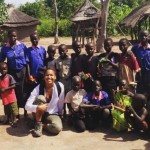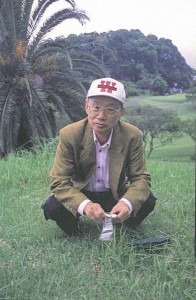I’m cross posting this interview with Wesleyan Psychology Professor Scott Plous, which originally appeared through our partners at Coursera. In addition to being a beloved teacher at Wes, Scott is the Founder and Executive Director of the Social Psychology Network, a nonprofit membership organization whose mission is “to promote peace, social justice, and sustainable living through public education, research, and the advancement of psychology.”
What would happen if thousands of people around the world spent an entire day being as compassionate to fellow human beings as possible? Thanks to Wesleyan University Professor Scott Plous’ Social Psychology course, we don’t have to wonder. The wildly popular class, which debuted on Coursera in 2013, culminates with a “Day of Compassion” assignment, for which students from India to Colombia to Australia have volunteered at hospitals, fought sexual abuse, become grassroots activists and even, in one case, saved a life. And the effects have proved to be long-lasting—as a result of the exercise, many students say their own lives have been transformed. Plous recently appeared on NPR’s “Hidden Brain” podcast to talk about the science of compassion with reporter Shankar Vedantam—and invited radio listeners everywhere to take on the 24-hour challenge. We caught up with Plous to discuss his journey from being an online learning skeptic to an outspoken advocate and to share his hopes for the NPR experiment.
Coursera: You coined the term “action teaching” in 2000. Can you explain what that means?
Scott Plous: In courses that employ action teaching, students contribute to the betterment of society at the same time that they learn about a particular topic. For example, students learning about persuasion or philanthropy might compare the effectiveness of different fundraising techniques by going into the local community and raising money for a nonprofit organization chosen by the class (for some award-winning examples, see ActionTeaching.org). In each of my courses, I include at least one action teaching assignment.
Coursera: You taught our largest single course session (enrolling over 250,000 learners!) and have become the Coursera equivalent of a rock star. But we know you were initially hesitant to develop an online course. Why?
SP: I hesitated for a few reasons. First, I wasn’t sure whether publishers and documentary filmmakers would contribute materials without charge, but, to their credit, McGraw-Hill and others donated free materials that would have cost students a total of more than $1,000 to buy. In addition, I wasn’t sure whether students would do the coursework without receiving college credit. Finally, I wasn’t sure if the course would be well-received by students from other cultures, including people who didn’t speak English as their first language. I’ve now run this course twice and am continually impressed by the effort and ability displayed by learners around the world.
Coursera: Now that you’ve tested the waters with amazing success, what, for you, is the biggest upside to open online courses?
SP: The opportunity to reach a larger and more diverse group of students than I normally would. For instance, in the 2013 session of my Social Psychology class, students came from roughly 200 countries, and about 100,000 of these students lived in countries with emerging economies — places with relatively limited access to higher education and psychology training.
Coursera: The Day of Compassion contest was a resounding success, but it was something that had had been part of your classes for years. What was different for you, as a teacher, about conducting it on such a grand scale?
SP: It was different in two ways. First, students carried out the assignment around the world, which led to a level of cultural exchange beyond what’s typically possible in a traditional college course. Second, students in the online course voted to honor a classmate with a “Day of Compassion Award” that included an expense-paid trip to personally meet the Dalai Lama (in the 2013 session) or Jane Goodall (in the 2014 session). During the award selection process, students also got the chance to read and learn from each other’s work.
Coursera: You’ve said that in order to truly deliver on action teaching, online courses need to “connect to the most urgent and important issues of the day.” What issues do you find yourself talking about most often with your students right now?
SP: The issues I’ve focused on most are peace, social justice, and climate change, but it’s important to note that action teaching isn’t limited to social psychology. Whether a course is in psychology, computer science, creative writing, business, or anything else, there’s usually a way to incorporate action teaching — not as a trade-off at the expense of core concepts but as a way of engaging students even further. For example, after business students learn about topics such as negotiation and conflict resolution, teachers can challenge them to go out and actually reduce a conflict in their life or in the life of others they know. The end result is that students will not only learn in a meaningful way but that the others will benefit, as well. In fact, what Shankar has done with his podcast could be called “action reporting.” He has found a way to improve the social condition even while educating and entertaining his listeners.
Coursera: We’re thrilled that you’re taking the challenge to the NPR audience and excited to see what happens. What are your hopes for what will happen?
SP: First, I hope listeners will give the exercise a try and see what happens. As the podcast suggests, many people find the experience transformative. Second, I hope listeners send their stories of compassion to Shankar, who has promised to showcase them in a future podcast (Shankar can be reached through NPR and is also on Twitter @HiddenBrain). Finally, I hope teachers in elementary school, middle school, high school, and college will try a Day of Compassion assignment with their own students. This year, students at Wesleyan University, where the exercise was first developed, will participate in the 15th Annual Day of Compassion, and I’m eager to read their reports!




